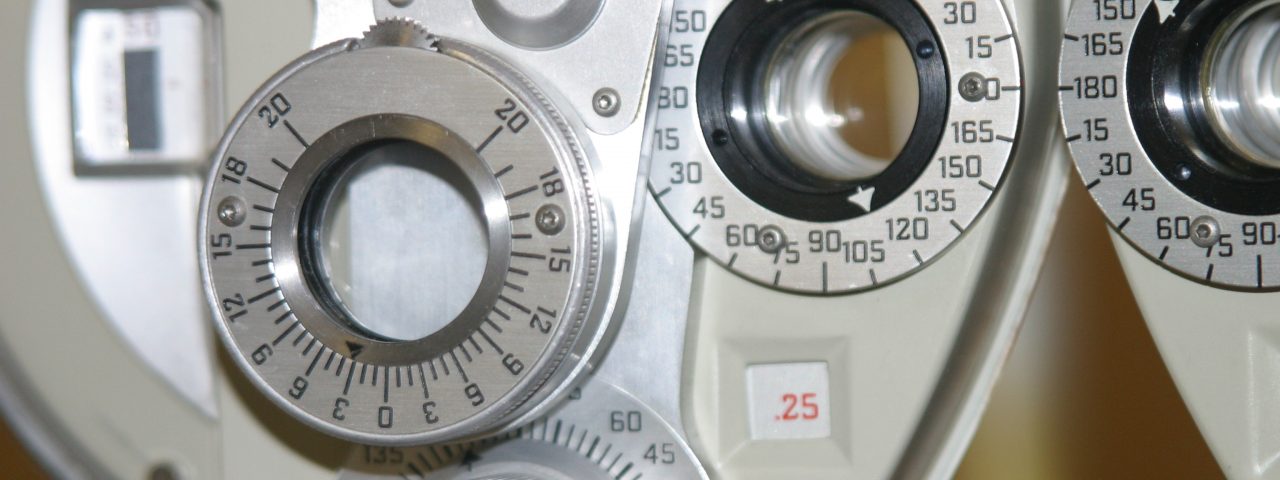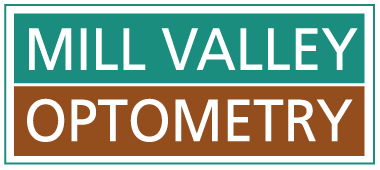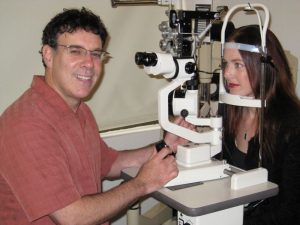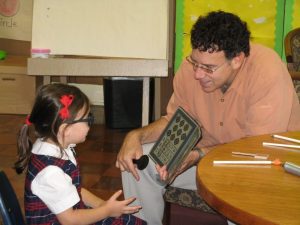
Thank you for choosing us for your comprehensive vision exam. Dr. Eliot Kaplan has practiced preventive and improvement vision care for over thirty five years, and prides himself and his staff in providing a very thorough evaluation, utilizing the latest high-tech equipment. In addition to the eye health evaluation, which includes a glaucoma assessment and a screening for ocular diseases, we also find it important to evaluate for any functional vision problems, which we can address with optometric vision therapy. Please take a look at all the services we offer for you and your family.
The American Optometric Association recommends scheduling your baby’s first eye assessment at 6 months. Our vision care specialist will test for excessive or unequal amounts of nearsightedness, farsightedness, or astigmatism; eye movement ability and evaluate eye health. It is important to identify children who have them at this young age. Vision development and eye health problems are easier to correct if treatment begins early.
InfantSEE®, a public health program, managed by Optometry Cares® – the AOA Foundation, is designed to ensure that eye and vision care becomes an essential part of infant wellness care to improve a child’s quality of life. Under this program, participating optometrists provide a comprehensive infant eye assessment between 6 and 12 months of age as a no-cost public service.
Children should then have additional eye exams at age 3, and just before they enter the first grade — at about age 5 or 6. Vision is one of the primary sense modalities, and its development is critical for helping a child explore their environment. We highly recommend you have your infant or child vision evaluated for health issues or refractive problems (myopia, hyperopia and amblyopia) before it affects the quality of their life.
If your child is working below potential, it is critical to determine if your child has difficulty with their eyesight or near visual skills. There is a high correlation between poor focusing or convergence skills with reading and learning ability. Even if your child has perfect distance eyesight, there may be a binocular vision or visual processing disorder that is making it difficult to learn efficiently in the classroom. Our Developmental Vision Exam is especially appropriate for any child with a diagnosed of a developmental delay, including Autism Spectrum Disorder, ADD, ADHD or dyslexia.
Optometric Vision Therapy is a treatment process used to improve visual function. It involves active participation of the patient in a series of guided activities. During weekly session, specific therapeutic games are taught to improve focusing, tracking and enhance 3-D vision. These developmental and rehabilitation programs remediate specific sensory, visual-motor and visual perceptual dysfunctions.
Children with developmental delays due to acquired or congenital conditions such as Autism Spectrum Disorder or Binocular Vision problems show improvement in school performance and behavior.
Amblyopia or lazy eye is the lack of development in an otherwise healthy eye. However, there are few signs that the child is having this problem. Amblyopia may be caused by the presence of strabismus (crossed eye), cataracts or high degrees of nearsightedness (myopia) or farsightedness (hyperopia). Infants born prematurely are at “high risk” for developing amblyopia.
Headaches, eyestrain, double and blurry vision are often the result of a binocular problem; due to the inability of the two eyes to function efficiently. Strabismus (crossed or wandering eye), which may be congenital or acquired is often treatable with eye glasses or optometric vision therapy. Specific binocular problems (focusing and eye tracking) interfere with reading efficiency and comprehension for adults and children. Depth perception or 3-D vision may be compromised; affecting balance, hand eye coordination and sports performance. We include a basic screening of these problems in our comprehensive vision exams.
Individuals of all ages who have experienced neurological insults can benefit from neuro-optometric rehabilitation. Visual problems caused by traumatic brain injury, cerebral vascular accident, cerebral palsy, multiple sclerosis, etc., may interfere with their performance and learning ability. Other problems such as balance and vestibular disorders may be exacerbated by the visual dysfunction. Treatment regimens encompass lenses and prisms, specifically prescribed occlusion and optometric visual therapy.
Our office has always been on the leading edge of fitting contacts for children and adults. We fit all types of soft and gas-permeable contacts. This includes daily disposable, astigmatic lenses, extended wear, traditional daily soft and multi-focal contacts which correct for presbyopia. Our specialty lenses include gas-permeable lenses, which correct for keratoconus and corneal transplants; and Orthokeratology Lenses for myopia improvement!


